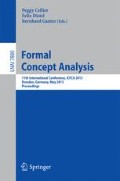Abstract
Formal concept analysis (FCA) provides an approach to restructuring important lattice structures such as complete lattices, distributive lattices and algebraic lattices. In this paper, we focus on the theoretical aspect of FCA and study the representation of algebraic domains by a special type of formal contexts. We first propose the notion of consistent \(\mathcal{F}\)-context and investigate the detailed properties. Then we study the induced implication rule systems of the consistent \(\mathcal{F}\)-contexts and propose the notion of formal implication rule systems as the axiomatization. The results show that \(\mathcal{F}\)-concepts inherent in consistent \(\mathcal{F}\)-contexts can be characterized equivalently by closed subsets derived from the formal implication rule systems. Furthermore, we study the order-theoretical properties of \(\mathcal{F}\)-concepts hierarchy (respectively, closed subsets family) of consistent \(\mathcal{F}\)-contexts (respectively, formal implication rule system). It is shown that both \(\mathcal{F}\)-contexts and formal implication rule systems can serve as appropriate tools to concretely represent algebraic domains.
This work is partly supported by the NSERC Discovery research grants of the third and fourth authors, and China Postdoctoral Science Foundation (No. 2012M521515) of the first author.
Access this chapter
Tax calculation will be finalised at checkout
Purchases are for personal use only
Preview
Unable to display preview. Download preview PDF.
References
Abramsky, S., Jung, A.: Domain theory. In: Abramsky, S., et al. (eds.) Handbook of Logic in Computer Science, vol. 3, pp. 1–168. Clarendon Press (1995)
Bělohlávek, R.: Concept lattices and order in fuzzy logic. Annals of Pure and Applied Logic 128, 277–298 (2004)
Davey, B.A., Priestley, H.A.: Introduction to Lattices and Order, 2nd edn. Cambridge University Press (2002)
Dolques, X., Huchard, M., Nebut, C., Saada, H.: Formal and relational concept analysis approaches in software engineering: An overview and an application to learn model transformation patterns in examples. In: The First ICESE Virtual Workshop, Search-based Model-Driven Engineering, Qatar (2011)
Faid, M., Missaoui, R., Godin, R.: Knowledge discovery in complex objects. Computational Intelligence 15(1), 28–49 (1999)
Ferré, S., Ridoux, O.: A logical generalization of formal concept analysis. In: Ganter, B., Mineau, G.W. (eds.) ICCS 2000. LNCS, vol. 1867, pp. 371–385. Springer, Heidelberg (2000)
Ganter, B., Kwuida, L.: Dicomplemented lattices: towards a representation theorem. Technical Report, MATH-AL-20-2002 (2002)
Ganter, B., Kwuida, L.: Representable weak dicomplementations on finite lattices. Contributions to General Algebra 14, J. Heyn, Klagenfurt, 63–72 (2004)
Ganter, B., Wille, R.: Formal Concept Analysis: Mathematical Foundations. Springer, Berlin (1999)
Gierz, G., Hofmann, K.H., Keimel, K., Lawson, J.D., Mislove, M., Scott, D.S.: Continuous Lattices and Domains. Cambridge University Press (2003)
Guo, L.K., Huang, F.P., Li, Q.G., Zhang, G.-Q.: Power contexts and their concept lattices. Discrete Mathematics 311, 2049–2063 (2011)
Hartung, G.: A topological representation of lattices. Algebra Universalis 29(2), 273–299 (1992)
Hartung, G.: Sublattices of topologically represented lattices. Acta Math. Univ. Comenianae LXIV(1), 25–41 (1995)
Hartung, G., Kamara, M., Săcărea, C.: Topological representation of polarity lattices. Acta Math. Univ. Comenianae LXVIII(1), 49–70 (1999)
Hitzler, P., Krötzsch, M., Zhang, G.-Q.: A categorical view on algebraic lattices in formal concept analysis. Fundamenta Informaticae 74, 1–29 (2006)
Huchard, M., Rouane Hacene, M., Roume, C., Valtchev, P.: Relational concept discovery in structured datasets. Ann. Math. Artif. Intell. 49, 39–76 (2007)
Kent, R.E.: Rough concept analysis: A synthesis of rough sets and formal concept analysis. Fundamenta Informaticae 27(2), 169–181 (1996)
Krajči, S.: A generalized concept lattice. Logic Journal of the IGPL 13(5), 543–550 (2005)
Kwuida, L.: Dicomplemented Lattices: A Contextual Generalization of Boolean Algebras. Shaker (2004)
Lai, H., Zhang, D.: Concept lattices of fuzzy contexts: Formal concept analysis vs. rough set theory. International Journal of Approximate Reasoning 50(5), 695–707 (2009)
Lei, Y., Luo, M.: Rough concept lattices and domains. Annals of Pure and Applied Logic 159, 333–340 (2009)
Popescu, A.: A general approach to fuzzy concepts. Mathematical Logic Quarterly 50, 265–280 (2004)
Valtchev, P., Missaoui, R., Godin, R., Meridji, M.: Generating Frequent Itemsets Incrementally: Two Novel Approaches Based on Galois Lattice Theory. Journal of Experimental & Theoretical Artificial Intelligence 14, 115–142 (2002)
Wang, L.D., Liu, X.D.: Concept analysis via rough set and AFS algebra. Information Sciences 178(21), 4125–4137 (2008)
Wille, R.: Restructuring lattice theory: An approach based on hierarchies of concepts. In: Rival, I. (ed.) Ordered Sets, Reidel, Dordrecht, Boston, pp. 445–470 (1982)
Yao, Y.: A comparative study of formal concept analysis and rough set theory in data analysis. In: Tsumoto, S., Słowiński, R., Komorowski, J., Grzymała-Busse, J.W. (eds.) RSCTC 2004. LNCS (LNAI), vol. 3066, pp. 59–68. Springer, Heidelberg (2004)
Zhang, G.-Q., Shen, G.Q.: Approximable concepts, Chu spaces, and information systems. Theory and Applications of Categories 17(5), 80–102 (2006)
Author information
Authors and Affiliations
Editor information
Editors and Affiliations
Rights and permissions
Copyright information
© 2013 Springer-Verlag Berlin Heidelberg
About this paper
Cite this paper
Guo, L., Li, Q., Valtchev, P., Godin, R. (2013). Formal \(\mathcal{F}\)-contexts and Their Induced Implication Rule Systems. In: Cellier, P., Distel, F., Ganter, B. (eds) Formal Concept Analysis. ICFCA 2013. Lecture Notes in Computer Science(), vol 7880. Springer, Berlin, Heidelberg. https://doi.org/10.1007/978-3-642-38317-5_9
Download citation
DOI: https://doi.org/10.1007/978-3-642-38317-5_9
Publisher Name: Springer, Berlin, Heidelberg
Print ISBN: 978-3-642-38316-8
Online ISBN: 978-3-642-38317-5
eBook Packages: Computer ScienceComputer Science (R0)

